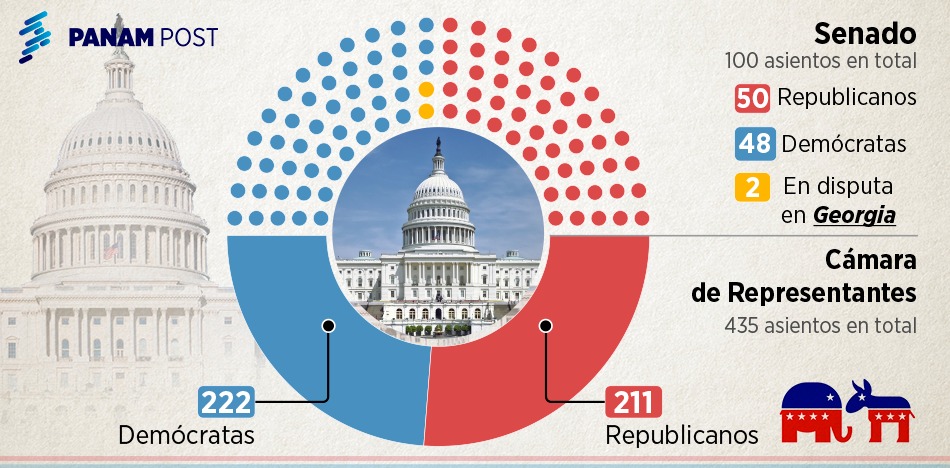
Spanish – The state of Georgia has, in recent days, become the epicenter of political power in the United States. The two Senate seats contested in the second round of voting this Tuesday, January 5, define much more than control of the Upper House. With Joe Biden in the White House and the House of Representatives in the hands of the Democrats, only a Republican victory in Georgia would guarantee the balance of power and a halt to socialist policies. The reverse would be to hand a blank check to the Democratic Party.
Therefore, Donald Trump and Joe Biden face each other again. Both the incumbent president and the president-elect mobilized to Georgia on Monday to try to tip the balance in favor of their party at the last minute in the race for control of the Senate.
So far, the results of the November 3 election give the advantage to the Republicans with 50 seats, while the Democrats are up to 48. According to Georgia state law, more than 50 percent of the vote is required to get a Senate seat. Neither of the two contested positions passed that threshold on November 3.
To win control of the Senate, Biden’s party needs to win both seats and add up the tie-breaking vote of the vice president, which in this case would be Kamala Harris. Trump’s party only needs to win at least one of the two seats in dispute to maintain control of the Upper House.
The danger of accumulating too much power
As far as the House of Representatives is concerned, the Democrats lost nine seats in the last elections. However, they passed the threshold of 218, allowing them to maintain control with a ratio of 222 Democrats to 211 Republicans.
If the Democratic Party succeeds in taking over the two contested seats in Georgia, Joe Biden would have a majority in both chambers to pass his proposals without much of a procedure. This would include endorsing his cabinet nominees, Supreme Court justices, ambassadors, and other positions of authority.
On the other hand, if the Republican Party manages to maintain control of the Senate, it would be guaranteeing the democratic balance established since 1787 in the US constitution to prevent any individual or party from accumulating too much power.
New Democratic Party: closer to socialism
The former US ambassador to the United Nations, Nikki Halley, recently issued a warning to Georgia’s voters. “The Democratic Party is not your grandparents’ Democratic Party.”
Halley was referring to Senatorial candidate Raphael Warnock, who evaded his Republican rival, Kelly Loeffler, in a debate when he asked him to explain his position on socialism. Warnock was also a youth pastor at the New York church that hosted Fidel Castro in 1995 when Castro traveled to the United States to participate in the UN General Assembly.
The Democratic Party is indeed not the same as it was a couple of decades ago. It is no longer just Senator Bernie Sanders and the so-called “squad,” made up of Congresswomen Alexandria Ocasio-Cortez, Ilhan Omar, Rashida Tlaib, and Ayanna Pressley. The socialist wing of the Democrats continues to grow dangerously at the Congress.
On November 3, Congressman Jamaal Bowman was elected from New York’s 16th District. He does not hide his Marxist ideology, even claiming that “capitalism is slavery by another name.”
Gregory Weldon Meeks, elected as the new chairman of the House Foreign Affairs Committee, is another Democratic congressman with ties to the Latin American left. In fact, he attended Hugo Chávez’s inauguration in Caracas.
A close election
The elections taking place in Georgia this Tuesday are of great importance not only because they define Senate control but also because an eventual victory of Raphael Warnock represents the incorporation into the legislative branch of the world’s leading power of one more left-wing ticket.
Before the elections of November 3, Georgia did not represent a concern for the Republicans, who had maintained a historic dominance in this state since 1996. With the adverse results for President Donald Trump, an opportunity began to open up for the Democrats. And with information leaked this weekend that compromises the president, the scenario has become uncertain.
The latest polls give Democrats Jon Ossoff and Raphael Warnock a 1.8% and 2.3% lead over Republicans David Perdue and Kelly Loeffler, respectively, Newsweek reported Monday. However, the publication clarifies that this narrow difference is within the 4% margin of error of most opinion studies. Therefore, the outcome will be “head to head,” impossible to predict.
These numbers were released on Sunday, the same day that the Washington Post revealed an audio recording of a phone call between President Trump and Georgia’s Secretary of State, Brad Raffensperger, where Trump asked Raffensperger to examine the results of the presidential election to find at least 11780 votes to overturn the result.
The role of the big media and the polls
The tentacles of Democratic globalism extend to all spheres of power, including the major media that have sided with Joe Biden since the presidential election campaign. Now, just 48 hours before the runoff election in Georgia that will define the control of the Senate, the Washington Post leaks the recording of a call to President Trump that compromises his image in that state.
Georgia is one of six states where the Republican leader’s legal team has filed lawsuits to challenge the election. Georgia’s popular vote advantage for Joe Biden was just 11779, or 0.2 percent. Trump’s campaign is keeping the dispute on the legal front for similar situations in Arizona, Nevada, Wisconsin, Michigan, and Pennsylvania.
The credibility of surveys is not at its best. The November 3 election gave Joe Biden a wide lead and a chance to win Texas and Florida, where Trump confirmed his leadership. Skepticism about the opinion polls is even greater when evaluating the performance in the 2016 election, in which all the pollsters gave the Democrat Hillary Clinton as the overwhelming winner.
 Versión Español
Versión Español













